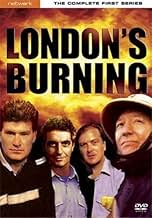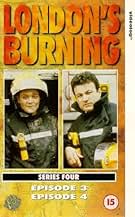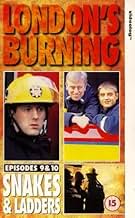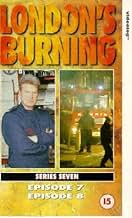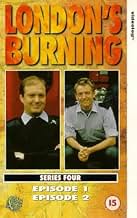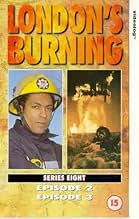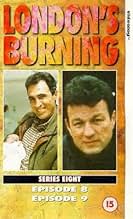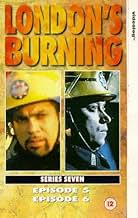NOTE IMDb
7,0/10
1,1 k
MA NOTE
Ajouter une intrigue dans votre langueBritish drama following the professional and personal lives of firefighters who put their lives on the line at Blackwall Fire Station in London, England.British drama following the professional and personal lives of firefighters who put their lives on the line at Blackwall Fire Station in London, England.British drama following the professional and personal lives of firefighters who put their lives on the line at Blackwall Fire Station in London, England.
- Nomination aux 1 BAFTA Award
- 1 victoire et 2 nominations au total
Parcourir les épisodes
Avis à la une
Being almost the last entertainment available on sunday nights before the grind of a new week, Londons burning with its up beat easy going jazzi music score as well as its distictive closing credit music was staple viewing in the UK through the 1990's. In fact we were first introduced to blue watch in a one off film in 1986 which could have easily been a pilot to the series. When then the series aired in 1988 most of the original watch from the film had returned to blackwall fire station. However, by this time the UK was in the midst of the heady days of Thatchers economic boom where the term Yuppie and Dinkis were became common phrases, a sharp contrast to the the grim events of the 1986 film.
That being said the UK prided itself with its down to earth working class early evening soap operas where ordinary people were just trying to get by dealing with all the everyday challenges in life. By contrast in the USA, all there soaps centered on wealth, power, ambition and revenge. The men despite their pearly white teeth and beach boy looks were shallow cartoon characters and the women although glamerous were one dimension barbi dolls. Although entertaining in their own right, those shows were not in any way a fair reflection of real people and there societies. By contrast, Londons burning was about fire fighters so it easily fitted into the type of tv which the UK had become accustomed to.
Looking back now I suspect that the producers left a lot of scenes on the cutting room floor as they tried to get the right balance of seriousness, humor, drama, character development as well as the action with the shouts. It was successful because the stories were entertaining, the show never dwelled on sentimentality or over played its hand in human interest or on the themes of social justice. Despite the deaths and some human tragedy, it was easy watching and the audience figures which were as high as 16 million were only a testament to this. The show really hit the sweet spot and entered the national consciousness probably between series 3 through 8. Although, seasons 9 and 10 were fairly solid, but you could just feel the air coming out of the show. After watching selected episodes on YouTube over the last 18 months I wasn't impressed with series 11 - 14.
The personnel turnover on the watch which may have been quite normal in the fire service, was eventually too much for the series. From the end of season 2 to the end of season 3 Vaseline, Tony, Charisma and station officer Tate left and the Bambi eyed Josie would also make way sometime between seasons 3-4. Malcolm left the show during season 5, replacements Kate and Colin left at the end of 5 and 6 respectively, then with the loss of Bayleaf, Kevin and Hallam during seasons 8 and 9, there were very few of the original cast left. Even Bullstrode and Scase who made reacuring rolls throughout the series were written out by the end of season 8, so overall l it think it all eventually all took it's toll.
Obviously new characters had to be introduced but with fireman from Australia, as well as European exchange firefighters, there was a sense that the show was losing its soul. The UK became more embroiled with the greater European project and I'm not sure blue watch were a good fit for the so-called hip Tony Blair years of "cool Brittania" where bacon butties, mugs of tea, pints of beer, and beefburger and chips gave way to designer drinks, lattes, wholegrain pasta and organic broccoli. Even the brown uniforms introduced made the firefighters look like a cross between maximum security prisoners and the Swiss Navy.
The proliferation of satelite tv and what they had to offer from America put pressure on terrestial tv for its viewing shares. Consequently, in an an attempt to keep up, the show changed its theme tune and tried to become more macho, middle class with squared jawed and well groomed fireman, hardly the fire fighting type. The women also had to be sexy and tough with tatoos. Was this a reflection of where society was moving or was it delving into american soap territory?
Either way, they couldnt keep up with the type of entertainment that younger viewers wanted and they alienated the older viewers. In the end the show ended in a trainwreck (no pun intended). Looking back. Perhaps the scene at bayleafs resturant at the end of season 8 where most of the watch were singing "smoke get's in your eyes" should have been the swan song for the series, after that as a reflection of how the country was changing the show began to lose its charm. All in all watching it today its a nostalgic strip down memory lane to a London that is forever lost and when British tv was great.
That being said the UK prided itself with its down to earth working class early evening soap operas where ordinary people were just trying to get by dealing with all the everyday challenges in life. By contrast in the USA, all there soaps centered on wealth, power, ambition and revenge. The men despite their pearly white teeth and beach boy looks were shallow cartoon characters and the women although glamerous were one dimension barbi dolls. Although entertaining in their own right, those shows were not in any way a fair reflection of real people and there societies. By contrast, Londons burning was about fire fighters so it easily fitted into the type of tv which the UK had become accustomed to.
Looking back now I suspect that the producers left a lot of scenes on the cutting room floor as they tried to get the right balance of seriousness, humor, drama, character development as well as the action with the shouts. It was successful because the stories were entertaining, the show never dwelled on sentimentality or over played its hand in human interest or on the themes of social justice. Despite the deaths and some human tragedy, it was easy watching and the audience figures which were as high as 16 million were only a testament to this. The show really hit the sweet spot and entered the national consciousness probably between series 3 through 8. Although, seasons 9 and 10 were fairly solid, but you could just feel the air coming out of the show. After watching selected episodes on YouTube over the last 18 months I wasn't impressed with series 11 - 14.
The personnel turnover on the watch which may have been quite normal in the fire service, was eventually too much for the series. From the end of season 2 to the end of season 3 Vaseline, Tony, Charisma and station officer Tate left and the Bambi eyed Josie would also make way sometime between seasons 3-4. Malcolm left the show during season 5, replacements Kate and Colin left at the end of 5 and 6 respectively, then with the loss of Bayleaf, Kevin and Hallam during seasons 8 and 9, there were very few of the original cast left. Even Bullstrode and Scase who made reacuring rolls throughout the series were written out by the end of season 8, so overall l it think it all eventually all took it's toll.
Obviously new characters had to be introduced but with fireman from Australia, as well as European exchange firefighters, there was a sense that the show was losing its soul. The UK became more embroiled with the greater European project and I'm not sure blue watch were a good fit for the so-called hip Tony Blair years of "cool Brittania" where bacon butties, mugs of tea, pints of beer, and beefburger and chips gave way to designer drinks, lattes, wholegrain pasta and organic broccoli. Even the brown uniforms introduced made the firefighters look like a cross between maximum security prisoners and the Swiss Navy.
The proliferation of satelite tv and what they had to offer from America put pressure on terrestial tv for its viewing shares. Consequently, in an an attempt to keep up, the show changed its theme tune and tried to become more macho, middle class with squared jawed and well groomed fireman, hardly the fire fighting type. The women also had to be sexy and tough with tatoos. Was this a reflection of where society was moving or was it delving into american soap territory?
Either way, they couldnt keep up with the type of entertainment that younger viewers wanted and they alienated the older viewers. In the end the show ended in a trainwreck (no pun intended). Looking back. Perhaps the scene at bayleafs resturant at the end of season 8 where most of the watch were singing "smoke get's in your eyes" should have been the swan song for the series, after that as a reflection of how the country was changing the show began to lose its charm. All in all watching it today its a nostalgic strip down memory lane to a London that is forever lost and when British tv was great.
Just discovered the entire series on Sky, so started to watch it again. Just finished Ep 3 of Series 1 - I guess seeing it again makes me realise how much London has changed since 1987 and from when this was filmed. A lot of the acting is really wooden and poor, and the scripts focus too much on their personal lives instead of actual emergencies.
Another thing noticeable is how awfully unattractive most of the wives & girlfriends & partners of the Blue Watch firefighters are - I guess the low budget is partly to blame.
But it's also interesting to see how the London Fire Brigade evolves over the course of the series - in terms of vehicles, equipment, uniforms etc. and makes you really appreciate how hard things were for them back in those days - so kudos and hats to them - for the excellent job they did back then and they do today & everyday to keep us and London safe!
Another thing noticeable is how awfully unattractive most of the wives & girlfriends & partners of the Blue Watch firefighters are - I guess the low budget is partly to blame.
But it's also interesting to see how the London Fire Brigade evolves over the course of the series - in terms of vehicles, equipment, uniforms etc. and makes you really appreciate how hard things were for them back in those days - so kudos and hats to them - for the excellent job they did back then and they do today & everyday to keep us and London safe!
London's Burning was a mainstay of ITV's Sunday night scheduling during the late 80's and 90's. The series emerged from the TV film written by the late and great Jack Rosenthal and followed a group of fire fighters belonging to Blue Watch at London's Blackwall fire station.
Initially the series kept a lot of Rosenthal's influence. The humour was lively with station pranks and the loves and lives of the watch being the backbone of the series. In between all this were the fires and other shouts which helped to highlight the diverse work of the fire brigade as their role has changed over the shows lifespan. A few dark moments relating to death or injury of the fire fighters or victims put a dark edge on the show which helped to prevent it from becoming a farce and the whole package made for extremely addictive viewing.
Sadly the last few series beginning in 2000 started the downward spiral. By 2000, most of the original cast had left as they had become disillusioned with the writing or wanted to pursue other opportunities before they became typecast. Their replacements were usually dour characters that had plenty of personal baggage and the humorous aspects were replaced by deep thoughts and crisis in relationships. ITV also tried to increase the number of episodes per year whilst reducing the budget which diminished the number of spectacular fires that the brigade would attend in a series and it became more of a soap rather than the refreshing series that it had been when it first started.
Eventually around 2001 the series was axed and it has now been replaced by Steel River Blues which has all the promise to be like London's Burning was in the early days.
Initially the series kept a lot of Rosenthal's influence. The humour was lively with station pranks and the loves and lives of the watch being the backbone of the series. In between all this were the fires and other shouts which helped to highlight the diverse work of the fire brigade as their role has changed over the shows lifespan. A few dark moments relating to death or injury of the fire fighters or victims put a dark edge on the show which helped to prevent it from becoming a farce and the whole package made for extremely addictive viewing.
Sadly the last few series beginning in 2000 started the downward spiral. By 2000, most of the original cast had left as they had become disillusioned with the writing or wanted to pursue other opportunities before they became typecast. Their replacements were usually dour characters that had plenty of personal baggage and the humorous aspects were replaced by deep thoughts and crisis in relationships. ITV also tried to increase the number of episodes per year whilst reducing the budget which diminished the number of spectacular fires that the brigade would attend in a series and it became more of a soap rather than the refreshing series that it had been when it first started.
Eventually around 2001 the series was axed and it has now been replaced by Steel River Blues which has all the promise to be like London's Burning was in the early days.
As it says in the title, London's Burning was one of the greatest drama's to appear on British television. It's mixture of gritty realism and humour made it one of the staples of ITV and was compulsive Sunday night viewing. Action packed story lines and superb acting ensured, in it's heyday, that viewing ratings were in excess of 18-19 million each episode. There were some bad points about the show, namely characters being alive and well at the end of a series, and in the next one not being there at all with no mention of them or explanation to where they went. E:g Carole Webb (Zoé Heyes), Rob Sharpe (Connor Lee). This was reinforced in 1998 when the show had it's first revamp with new opening titles and theme tune. Oh and Jim Alexander joined as well :P (!) Story lines changed and the programme was more focused on the personal lives of the characters (Chris Hammond's gambling debts, Jack's divorce and mental breakdown) Added to that in 2001 Richard Walsh (Sicknote) who was the only original character from the movie/pilot episode was killed off and that left Glen Murphy (George Green) as the only original character from the 1988 series when it first started. 2002 was the final straw as story lines were more sexual and unbelievable (A satellite was going to fall from Outer Space and crush London (!) (!) ) London's Burning was promptly axed and lets be honest, it was ITV/LWT that killed it off with it's new direction. But the show still deserves a 10/10 for the enjoyment and legacy it left behind. Oh and Jim Alexander was in the show as well...... Oh yeah I already mentioned that!! :P
After 9/11, the producers thought they could cash in on the hero status of firemen. They junked the episodes already made and remade the 2002 series - and it was rubbish! They alienated the existing fan base and failed to attrach new fans, so that it plumetted in the ratings. Yet another example of a long-running favourite being destroyed by producers who "updated" a successful favourite. ITV has done this so often, you wonder why they don't learn!
Le saviez-vous
- AnecdotesSeveral of the location shoots throughout the entire series were shot in Cambridgeshire and involved not just the cast and real firefighters from the London fire brigade but also featured crews from Cambridge fire and rescue service too.
- ConnexionsFeatured in Alright on the Night's Cockup Trip (1996)
Meilleurs choix
Connectez-vous pour évaluer et suivre la liste de favoris afin de recevoir des recommandations personnalisées
- How many seasons does London's Burning have?Alimenté par Alexa
Détails
- Date de sortie
- Pays d’origine
- Langue
- Aussi connu sous le nom de
- London's Burning
- Lieux de tournage
- Leyton Fire Station, Church Road, Leyton, Londres, Angleterre, Royaume-Uni(exterior of Blackwall Fire Station 2001-2002)
- Société de production
- Voir plus de crédits d'entreprise sur IMDbPro
Contribuer à cette page
Suggérer une modification ou ajouter du contenu manquant

Lacune principale
By what name was La brigade du courage (1988) officially released in India in English?
Répondre


